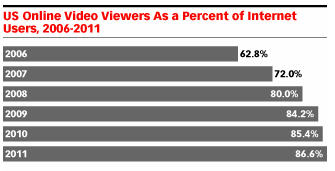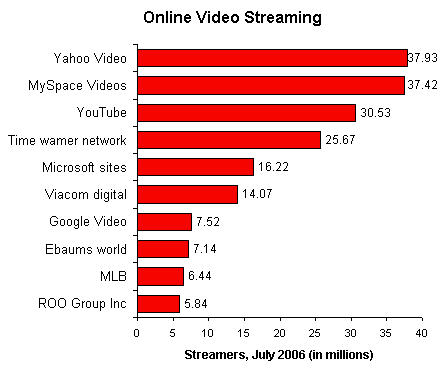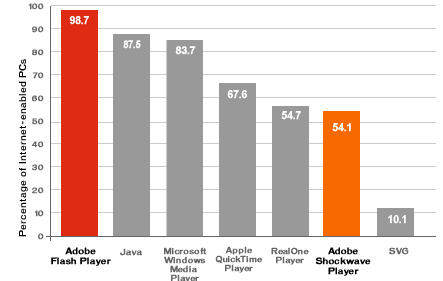Background
- Web video can be defined as the video clip in digital format found on internet. As new websites focusing entirely on offering free video clip to users, there were tens of millions of video clips available online by mid 2006.
- The use of internet video is growing very fast. Between March and July of the year 2006 YouTube alone grew from 30 to 100 million views of videos per day.
- BBC has released BBC's iPlayer in July 2007 based on internet video. Source
- Some file formats available in web video are Quicktime (.mov), Windows Media (.wmv), Flash Video (.flv), and MPEG4 files (.mp4) Source
Adoption
US Adoption
- The number of viewers will rise from 114 million in 2006 to 183 million in 2011.
- MySpace tops both Yahoo and YouTube in Web Videos
- All major Internet companies involved in online video such as Google, Yahoo, YouTube and Microsoft use the Flash video format.
- 97% of Web users can see instantly, hassle-free and without having to download any special software or plug-ins.
- Flash Player installs are driven by content, and new releases of Flash Player take approximately 12 months to reach 90% penetration.There are approximately 8 Million Flash Players installed every day.
Product innovation: Flash Player 9
- Flash Player 9 Update 3 Beta 2(Moviestar) supports H.264 video and HE-AAC audio and hardware accelerated, multi-core full screen video playback maintaining backwards compatibility by supporting On2VP6 video codec, in addition to the Sorenson Spark codec.
- The system also contains new Flash Player cache for common platform components, such as the Flex framework, to reduce application sizes and start-up times.
- Flash Player supports HE-AAC v2 which is an extension of AAC that uses Spectral Band Replication (SBR) and Parametric Stereo (PS) techniques to increase coding efficiency at low bitrates.
- HE AAC enables the delivery of 5.1 surround sound at 128 kbps, consumer-grade stereo at 48 kbps, and excellent quality stereo at 32 kbps or below.
Advantages
- High video quality, resolution and low storage requirements
- Improvement in the performance and quality of full-screen mode through the use of hardware scaling.
- Optimizing the On2 decoder for decode performance and reducing blockiness.
- Player cache reduces SWF size and download times
Disadvantages
- High Computational overhead
- Present PCs dont have capability to process this information
- Extra hardware acceleration is needed for performing In-loop deblocking, motion compensation, and inverse transform portions of H.264 decoding. ATI’s VPU (Visual Processing Unit)can be used as a solution.
DRM
- Flash DRM is a big deal. It's not something people like, especially because the allure of Flash is that it's a simple experience, but big studios want it.
- MPEG LA's AVC Patent Portfolio License provides fair, reasonable, nondiscriminatory access to essential AVC/H.264 patents owned by many patent holders as an alternative to negotiating separate licenses.
- Streaming H.264 video or AAC audio into the Flash Player by 3rd party streaming servers will be allowed only by proper licensing.
- Commerical use of H.264 and AAC streams can be done using proper licensing (ie broadcasting fees).
- On2, the company behind the codec for Flash Video, announced that they are actually partnering with Widevine to provide the DRM solution. The DRM protection may include content integrity protection and identity-based content protection.Source-zdnet
Summary of licencing terms for H.264
Upcoming features
- H.264 implementation in Flash Player will support alpha channel in upcoming player (probably flash player 10). Alpha channel is used to maintain background quality in images from frame to frame.
- Multichannel playback will be come in advanced versions of flash player
Trends from patents
- Video conferencing, Online video sharing and Online video advertising are the active areas for IP activity.
- Bit rate and resolution are the two main elements which affect the quality of the video played online. Compression or coding of the video effects the video.
- Single-loop spatial scalability coding, Network congestion detection and control,Editing a low-resolution media asset to generate a high-resolution edited media asset etc are some of the hot trends in improving video quality.
Product trends
| Flash 9- Moviestar | Others | |
| Codec- Video compression | H.264 ("MPEG-4 Part 10 or AVC) | MPEG-2 |
| Quality and Size (Bit-rate) | Better compression efficiency | Lesser relatively |
| Higher video quality at a given bit-rate | Reduction in artifacts such as blockiness, color bands etc. | Less video quality |
| Higher resolution | 2000000 pixels per frame | 350000 pixels per frame |
| Lower storage requirements | Large amount of data can be stored in Optical disk formats (Blu-ray Disc, and HD-DVD) | Lesser relatively |
| Compression ratio | Higher 2- 3 times more than MPEG-2 | Lesser relatively |
| Decoding technique | ||
| Entropy encoding | Support variable encoding techniques- CABAC (Context-based Adaptive Binary Arithmetic Coding) scheme | Fixed scheme |
| Block size | Simultaneous mixing of different block sizes till 4 pixels | Fixed block size of 16 pixels |
| In-loop deblocking | Previously ’deblocked’ image data, in addition to being displayed, is actually used as part of the decoding of future frames | No |
| Computational overhead | ATI’s VPU (Visual Processing Unit) to accelerate the H.264 decoding process | No Computational overhead |
Products
| Product | Abstract | Minimum System Requirement | Image |
| Windows Media Player with Audio Professional codec | Windows Media Player uses the Windows Media Audio 10 Professional codec, which delivers the highest possible audio fidelity—up to 7.1 channels of audio and full 24-bit, 96 kHz support | *Windows Vista or Windows XP * Windows Media Player * 5.1 sound card * 5.1 speakers |
|
| BBC’s iplayer | Recently developed player based on web video. | * Windows XP operating system * Minimum 500Mb (RAM) memory * Internet Explorer 6 browser (or later) * Windows Media Player 10 (or later) * Video and sound card capable of playing high quality streamed or downloaded programs * JavaScript, ActiveX and Cookies are all enabled * High speed broadband internet connection |
Opinions: Flash 9
Pros
- Full screen web video features
- Can buffer videos for 20 minutes at a time
- H.264 video encoding
- Can support mobile devices, set top boxes etc.
- Can support different High Definition (HD) content
- Includes security of coded program?
- Any MPEG4 encoder can be used for encoding
Cons
- Licensing costs are too high
- No support for .MOV files
- Hardware acceleration makes system performance unacceptable
- Large file sizes occupy excessive bandwidth
- Third party servers are not allowed
- No support for 64-bit Linux
References
Contact Dolcera
| Samir Raiyani |
|---|
| Email: info@dolcera.com |
| Phone: +1-650-269-7952 |




